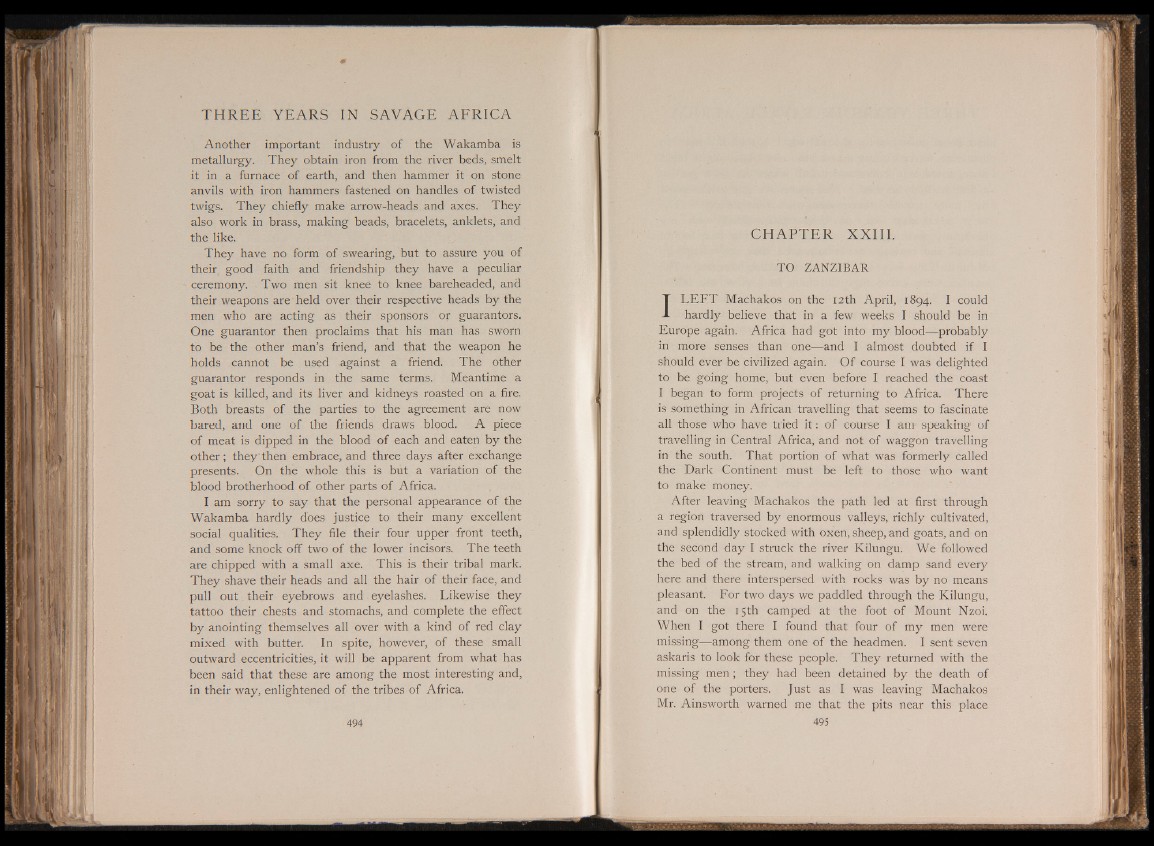
Another important industry of the Wakamba is
metallurgy. They obtain iron from the river beds, smelt
it in a furnace of earth, and then hammer it on stone
anvils with iron hammers fastened on handles of twisted
twigs. They chiefly make arrow-heads and axes. They
also work in brass, making beads, bracelets, anklets, and
the like.
They have no form of swearing, but to assure you of
their good faith and friendship they have a peculiar
ceremony. Two men sit knee to knee bareheaded, and
their weapons are held over their respective heads by the
men who are acting as their sponsors or guarantors.
One guarantor then proclaims that his man has sworn
to be the other man’s friend, and that the weapon he
holds cannot be used against a friend. The other
guarantor responds in the same terms. Meantime a
goat is killed, and its liver and kidneys roasted on a fire.
Both breasts of the parties to the agreement are now
bared, and one of the friends draws blood. A piece
of meat is dipped in the blood of each and eaten by the
other; they' then embrace, and three days after exchange
presents. On the whole this is but a variation of the
blood brotherhood of other parts of Africa.
I am sorry to say that the personal appearance of tljie
Wakamba hardly does justice to their many excellent
social qualities. They file their four upper front teeth,
and some knock off two of the lower incisors. The teeth
are chipped with a small axe. This is their tribal mark.
They shave their heads and all the hair of their face, and
pull out their eyebrows and eyelashes. Likewise they
tattoo their chests and stomachs, and complete the effect
by anointing themselves all over with a kind of red clay
mixed with butter. In spite, however, of these small
outward eccentricities, it will be apparent from what has
been said that these are among the most interesting and,
in their way, enlightened of the tribes of Africa.
C H A P T E R X X I I I .
TO ZANZIBAR
I L E FT Machakos on the 12th April, 1894. I could
hardly believe that in a few weeks I should be in
Europe again. Africa had got into my blood—probably
in more senses than one—and I almost doubted if I
should ever be civilized again. Of course I was delighted
to be going home, but even before I reached the coast
I began to form projects of returning to Africa. There
is something in African travelling that seems to fascinate
all those who have tried i t : of course I am- speaking of
travelling in Central Africa, and not of waggon travelling
in the south. That portion of what was formerly called
the Dark Continent must be left to those who want
to make money.
After leaving Machakos the path led at first through
a region traversed by enormous valleys, richly cultivated,
and splendidly stocked with oxen, sheep, and goats, and on
the second day I struck the river Kilungu. We followed
the bed of the stream, and walking on damp sand every
here and there interspersed with rocks was by no means
pleasant. For two days we paddled through the Kilungu,
and on the 15 th camped at the foot of Mount Nzoi.
When I got there I found that four of my men were
missing—among them one of the headmen. I sent seven
askaris to look for these people. They returned with the
missing men ; they had been detained by the death of
one of the porters. Just as I was leaving Machakos
Mr. Ainsworth warned me that the pits near this place
495